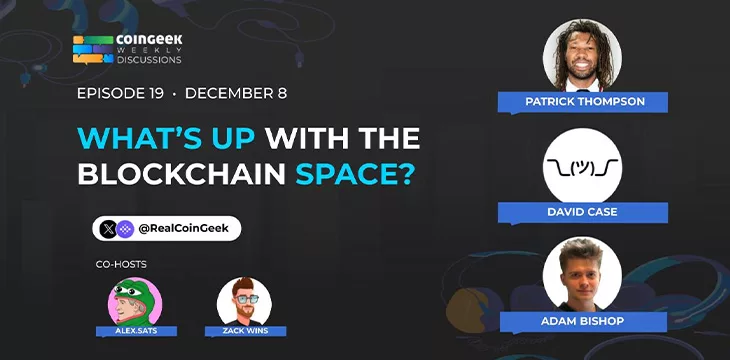|
Getting your Trinity Audio player ready...
|
On this week’s episode of CoinGeek Discussions, co-hosts Zachary Weiner and Alex Vidal hosted Patrick Thompson from AI Forge, Adam Bishop from Tegment Gaming, and BSV developer David Case. Check out this lively discussion on how AI and blockchain will work together, what BSV micropayments mean for gaming, and much more.
What’s the most important news in blockchain right now?
Weiner answers that Lock-to-Mint on BSV blockchain has his attention. He minted HODL earlier in the week and even kicked off another idea (OG). Already, a lock involving 5,000 coins for Bamboo has happened, making for several huge Lock-to-Mint events in just eight or nine days. Lock-to-Mint is holding your coins into the future rather than spending them, he explains.
Thompson says he isn’t paying as much attention to the blockchain space as he used to. However, he notes a general excitement about it all again. Many bad things happened in the past 12-18 months, and those seem to be mostly behind us now.
Bishop says many positive things are coming out of the BSV blockchain, but most attention seems to be on BTC and Ordinals. This could lead to a chain split. He’s just keeping his head down and working for now.
Case says he has been focused on Bitcoin contracts that interact with token balances. These contracts can control and enforce what happens to given tokens. He released a contract that allows anyone to define a new token and metrics that control its distribution when coins are locked. Bamboo was the first one, and it fully minted out. There are lots of potential real-world applications for this, he notes.
Weiner says that locking coins is exciting because it’s novel. It’s not the same as spending them, so people willingly participate, knowing they’ll be made whole in the end. Some people locked as many as 200 coins to get Bamboo—that shows serious conviction.
Will other blockchains try to replicate locking?
Vidal asks whether other blockchains might try to replicate what’s happening on the BSV blockchain.
Case replies that it’s technically possible on BTC to an extent, but on-chain code can’t enforce rules. The fees on other popular chains like BTC and ETH are also an issue. Programmability doesn’t exist similarly, and many opcodes have been disabled.
What is AI Forge, and what is the incubator up to?
Thompson explains that it’s an AI startup incubator. It’s a 12-week program that runs three times per year. The aim is to connect AI startups with resources to help them thrive.
Week 12 has a demo day where founders can connect with potential investors and customers. This is all crucial for early-stage startups, especially the first week when AI Forge helps entrepreneurs validate their ideas. So many people build cool things, but there’s no market demand for them, he says.
While Thompson doesn’t want to pick favorites, he points to VocalBrain as a great example. This is a voice trainer with AI analyzing someone’s singing and spotting areas for improvement.
Thompson then reflects on how AI and blockchain can work together and intersect. Blockchain can be used to determine what is real and what changes were made to data. One of the startups in the first AI Forge cohort found a way to use blockchain and AI to track changes and alert firms about whether they were compliant.
Adam Bishop talks about blockchain and gaming
Bishop is the CEO of Tegment Gaming and is the CMO at Vaionex Corporation. He talks about how, in the early days of his Bitcoin journey, he and his team modified a Counter-Strike server so players got a micropayment each time there was a kill.
However, they soon discovered this model was limited, so they set about developing their own platform. This will be released within two weeks, and there will be launch events in London and Saudi Arabia.
To begin with, the platform will be available via a desktop app and web platform. Eventually, he wants it on Playstations, XBoxes, and other popular consoles and integrated with games like FIFA. Games will be integrated individually, and the platform will use AI to monitor streams of games so players can bet against each other.
To hear more about Tegment’s new gaming platform, what Lock-to-Mint means, and BTC’s scaling issues now that the Lightning Network is officially dead, listen to the CoinGeek Discussions episode here.
Watch: AI, Blockchain, and secret to winning in technology

 07-11-2025
07-11-2025 





